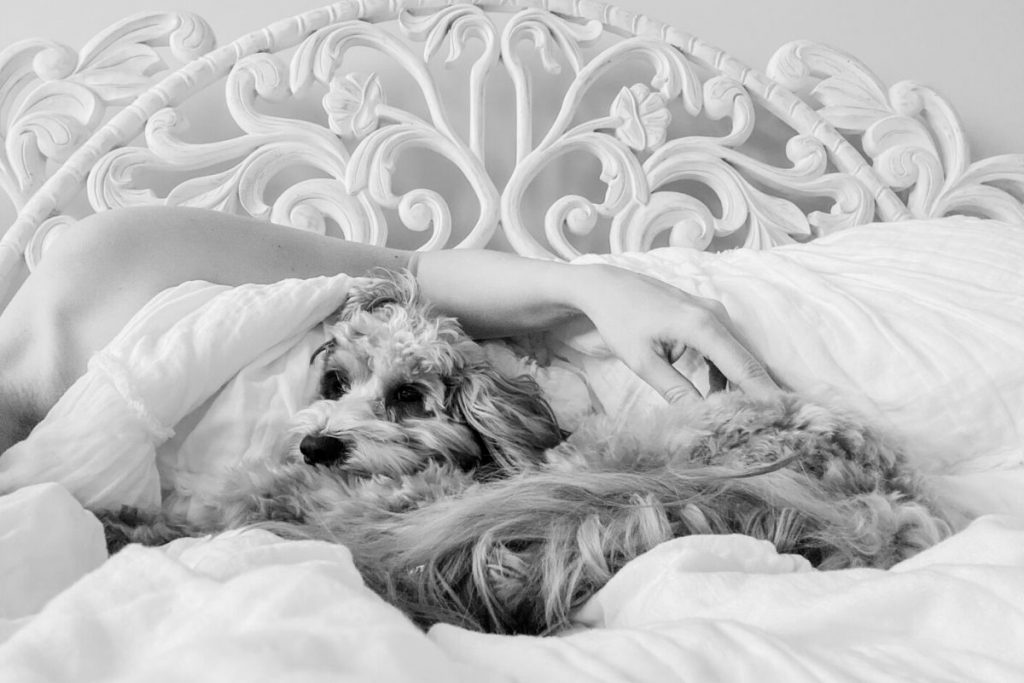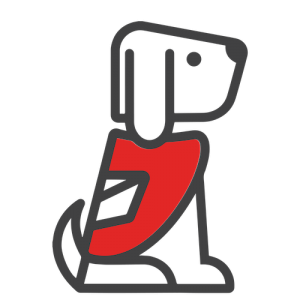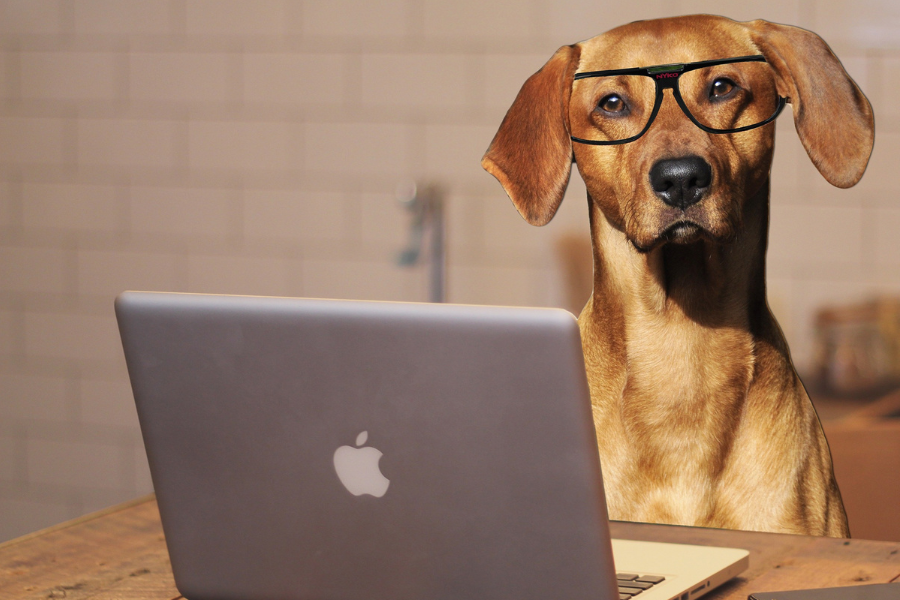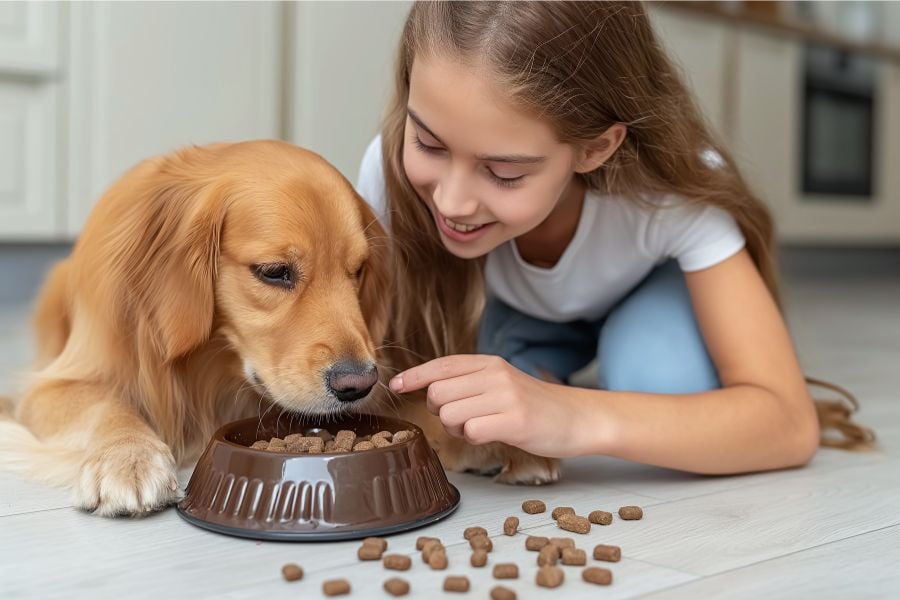
My Journey with Anxiety and a Pup named Cooper: An Interview with April Ashcrop
- Published on:
- By: ASP Team
I am writing this while sitting on a gorgeous wrap-around porch in Kiawah Island, SC. It is beautiful here. The smell of ocean air mixed with freshly blooming florals is pretty magical. The breeze is still crisp, so I’m wearing an oversized sweater experiencing all of the cozy vibes. In between sipping on my morning coffee and taking in this incredible scene, I reflect on a conversation I had with a good friend yesterday. We’ve been friends for over ten years, so even on a quick, fun getaway, we still bypass small talk and get right to the good stuff. We got into the topic of anxiety. I live and cope with it regularly but wasn’t aware she had experienced it her whole life. Yea, yea, I know⎯⎯how could we not have talked about it? I don’t know. Maybe I was a little embarrassed and thought I should “be stronger.” It is incredible how much less lonely knowing someone else understands can make one feel. I was humbled as I listened to her ongoing journey with anxiety.
The tricky part about this story is that she is a very successful businesswoman. Outwardly one might say she “has it all.” She makes a lot of money, she’s gorgeous, has the house we all dream of, drives the car she’s always wanted, and has a slew of quality friendships (myself included *wink). Of course, we all compete with the true love of her life, Cooper. To be clear, Cooper is a floofy, wet-nosed, waggy-tailed Goldendoodle. One might say he looks like a living stuffed bear, and I would have to agree. His personality is to be envied as he is the jolliest, most loving pup I’ve ever met. FINE COOPER, you get to be the favorite.
Anyways, I asked if she would be okay with me sharing our chat because of the value it brought to my life. She lovingly and happily gave me permission because that’s just who she is. There was a lot of in-between gabs because, ya know, girl talk, so for the sake of readability, I will share our chat “interview style.” I will also be running this by April before publishing for her final approval, so I can’t be blamed if you don’t like it. Kidding, kidding, okay, let’s jump in.
Get Your ESA Today
ATTENTION
Due to the new Department of Transportation (DOT) policy, Emotional Support Animals are NO longer allowed to fly in airplane cabins for free. However, Psychiatric Service Dogs are eligible.

When did you first notice your anxiety?
A: “It was back in high school. I was supposed to go to a club event, and I totally skipped out on it. Strangely, I really wanted to go but also kept feeling like I couldn’t. It’s kind of hard to explain, I guess. I wasn’t sick or tired. Nothing was actually wrong. I couldn’t make myself go and didn’t know why. I just felt a sort of hesitation and anxiousness when I thought about going. A paralysis of sorts that I had zero control over. This would be the first of what turned into many times after that I would get fully ready and end up not going to something. That is when I realized something might be up. Of course, looking back now, I know that was anxiety.”
What did it feel like?
A: “Umm, hmm, I guess it felt as close to fear as possible with no identifiable reason to be afraid. Super confusing. I was just scared. When I thought about going, I felt a tightness in my chest, nauseous, shortness of breath, and this immediate need to get back into bed. The thought of going made me feel tired. Even though a part of me actually wanted to go to the event, the exhaustion from stress made me feel overwhelmed by the idea. It’s weird because I actually have a very extroverted personality, but I feel frozen by fear when anxiety hits. Weird, right? I can’t even decipher the actual fear most of the time, but my body is on high alert. We then dove into the anatomy of fear and how the amygdala plays a role in our fight/flight response, but that is a convo for another time.”
Do you have a specific anxiety event that stands out the most?
A: “I hate that the answer to this question is a YES. I want it so bad to be a no, but the truth is what it is.”
“I’ve missed some pretty big life moments, like the kind that don’t happen twice, so it’s hard to narrow it down to just one. One that stands out pretty loudly is missing a funeral in my family, which is a big deal, and there were lasting consequences. People were and are still mad at me for that. I let them down, which is a big thing. Of course, in hindsight, I say, ‘April, you should have gone no matter what,’ but at the time, the anxiety was debilitating. That paralysis thing that I talked about before was in full strength.”
“I also didn’t go to my college graduation, which some might say is a big deal. (nervous laughter) I had already purchased my clothing for it, I had my hair all ready for pictures, and I had looked forward to this moment for months. Years actually, if I think about it. The morning of graduation day, I thought about shaking hands with the Dean as I got my diploma. I was like, ‘Nope, can’t do it,’ and I stayed in bed. Anxiety rushed in like a freight train, and I wasn’t up for the exhaustion of it all. I was lying there in bed, trying to go back to sleep so I didn’t have to feel all of the nervous and devastating feelings. I lived in my own little personal prison built by me, managed by me. That stands as one of the most significant events that inspired me to look a little more at my anxiety.”
How often would you say debilitating anxiety prevented or prevents you from living your day-to-day life?
A: “So, it’s kind of weird. For me, anxiety came and still comes in waves, or seasons rather. Sometimes it would be something I couldn’t do every single day, like going to work. I had a long bout of debilitating anxiety and lost a job during that time. There would be other times that 6 months could go by, and I wasn’t even bothered by it. That is kind of what made it so hard for me to figure out. It was very unpredictable and could show up at any time. That mystery caused a bit of ‘normal’ daily anxiety, but I’d gotten used to living with a regular amount of that. I did start noticing apparent triggers. New people and new situations seem to be a big one for me.”
“Back then, and still now. As I have learned to pay attention to my body and its signals, I have learned to be proactive with the actions to follow. If I know a predictably anxious situation might be on the horizon, I know I will need coping methods on standby. The tools I might use vary. Sometimes it is scheduling a proactive visit with my therapist. I might also say ‘no’ to four things so I can say ‘yes’ to one. I know that’s not really a simple answer, but it is everyday life for me and probably many others living with anxiety. Each person has a unique set of triggers, responses, and coping tools that work for them. One might benefit from something that another may not, so it’s essential to do the work of learning individual needs.”

What tools have you used to help cope with anxiety?
A: “As I mentioned, therapy is an ongoing tool for me. I also know I need a great circle of honest friendships. I have individuals in my life with who I can share tough things without being afraid of judgment or criticism. I spent a good number of years trying to perform for the acceptance of others. I discovered that was gasoline for my anxiety fire. I operate the best when I feel permission to be authentically me. It took a lot of years of surrounding myself with ‘safe’ people for me to even feel permission to discover who ‘me’ even was. I actually like her a lot now. Fake just doesn’t work for me.
“I practice daily gratitude by texting a girlfriend 5 things I am grateful for. It can be as simple as clean drinking water and a stocked refrigerator. She then does the same. It is very uplifting.”
“Also, I keep a daily journal. I note the previously mentioned grateful items first and then let my thoughts guide the pen for the rest of the time until I feel like I ‘got them out.’ I try to limit it to about 10 minutes a day, so I have a small achievable goal that can be easily met. That comes with a sense of accomplishment. I can’t encourage this practice enough. I have revisited these entries throughout the years for encouragement and helpful reminders to never give up. I am also proud that I stuck to something, and I feel like that gives me the courage to tackle other things.”
“This next one is a doozy but was a major gamechanger. I limit caffeine greatly. I know, I know, but I learned it is a big trigger for my anxiety⎯⎯like BIG. I can’t emphasize this one enough. I heard chatter about it and suspected it might be a factor in my own journey, and I was right. Since limiting my daily coffee to one cup a day that I sip very slowly, I have noticed a considerable decrease in anxiety. I was used to drinking a lot of caffeine, so it sucked for a couple of weeks, and then it didn’t. Worth it.”
“I recently started practicing yoga, which helps me keep a positive mindset and reminds me to stay present. It is also my commitment to moving my body daily. I had become accustomed to sitting a lot on days where I needed to be on the computer. I had no clue what an impact it had on my physical and mental wellbeing. Once I started yoga, It became something I really looked forward to and still do. The breathwork and movement is really good for those happy brain chemicals. I’m a big fan of those. So, it reserves the same time on my calendar every single day: no phone calls, no texts, no meetings, no emails during that time. If you know me, and you do…you know this took some getting used to.”
“For a while, I was on a medication of some sort. I can’t remember the name because it was 20 years ago, but it was beneficial at the time. I took it with the deep intention of only using it until I discovered other ways to cope, but I will take it again if I ever need it again. Meds exist for a reason, and I wasn’t too proud to admit that I needed help.”
“Currently, I’ve been really successful with non-medical coping tools. The biggest surprise for me was my dog, Cooper. As mentioned above, he owns my heart. I might even go as far as to say that he has made the most substantial impact on my anxiety management. His presence and sunshine have helped me dig out of some pretty deep depression trenches. After a bad experience trying to find a home to rent without a ‘no pet’ policy, I decided to research Emotional Support Animals to see if we qualified. He is 100% my ESA, so I did go ahead and decide to make it legal. Because of my line of work, I move a lot. Renting is just more logical for me, but I needed documentation to protect Cooper’s housing situation. I never want to move and not find suitable housing because of ‘no pet’ rules. As it stands, this dog literally plays a role in my emotional health, and life without him would be devastating. I want the flexibility of not owning a home and don’t feel like I should have to lose or pay outrageous fees for a family member to live with me because of that.”
Why a Goldendoodle?
A: “I chose the Goldendoodle breed because I heard their number #1 trait was that they are considered the ‘class clowns’ of dogs. I thought having that happy feeling in my house would be really amazing. I will say now that I own one, the clown shoe fits. The surprising thing I didn’t know was how emotionally sensitive and aware Cooper would be. If I have a day where I feel really down or overwhelmed, I notice he stays very close and attentive to me. If I have a moment where I am crying, he licks my face and assures me that he will be there. Yes, I am officially one of those people who loves dog kisses now. I had no idea that Goldendoodles were known for hugging, but I looked it up after he continued to do it. It’s actually a thing very specific to that breed. On days that I have a hard time getting motivated, he reminds me that every moment in life is a treasure.”
How has Cooper impacted your daily life?
A: “He loves to sleep at the foot of my bed and has actually become my alarm clock. He comes up to me at the exact same moment every morning and licks my face. How could anyone ever wake up in a bad mood? This will sound weird, but I really don’t care. When Cooper licks my face, it immediately boosts my mood. I totally get why dog parents love the face licks. Let the record state that I used to think it was gross and weird, so no judgment to anyone who is still in that boat. For me, it immediately makes me extremely happy, and I love it. Not just my face either. Hand licks are magical too.”
“I work from home, which can be really isolating—super bad for anxiety. I used to get SO lonely, which really affected how I approached work, my outlook on life, and my motivation to do anything. That would lead to some pretty dark moments for me. Depression, awful eating habits, and terrible thinking was becoming all too familiar. Having constant companionship in Cooper has helped me so much. What’s weird is that it can be as simple as his floofy paw next to me while I’m working. It gives me a level of quiet comfort that helps me relax and get a ton done without being distracted by loneliness. Going on walks together has helped with socialization and being less anxious around new people or places. Walks also force me to go outside, breathe fresh air, and get my body moving. I actually look forward to it as a nice break in the day.

What would you tell others who are considering getting a dog as an emotional support companion?
A: “A couple things. I would say it was surprisingly one of the best things I have ever done in my life. If you are even considering it, YES, go for it. It was a quick and painless process that made an enormous impact on my peace of mind. Invisible battles are hard for others to understand, so it’s up to you to protect yourself. Don’t let stigmas and criticism keep you from doing what you need to do to feel safe and comforted. ‘They’ say those who struggle with anxiety and depression should “get out there and volunteer.” For me, taking care of my dog is my way of volunteering my time and attention to something other than my anxiety.”
The last thing I will say is actually regarding recent law changes. Not everyone knows that Emotional Support Animals are no longer recognized by most airlines. This doesn’t affect me directly now as I am mostly working from home, but I am looking into training Cooper to become a Psychiatric Service Dog. He knows how to sit, shake, and stay, and we are in the process of him learning a specific task that helps me calm down during anxious moments. (aka face-licking) He’s doing great, and I’m excited to know that if I needed to fly with him in an airplane cabin, it would be possible as a Psychiatric Service Dog. Don’t even get me started on my flight anxiety!” (laughs)
I hope you enjoyed my chat with April. My biggest takeaway from our time together is how isolating anxiety can be and how dialoguing and talking about it can be helpful for all parties involved. It made me wonder how many others have struggled silently for years in fear and loneliness. It shouldn’t be that way and I hope more conversations like this one occur.
If you are curious about getting qualified for an Emotional Support Animal or Psychiatric Service Dog, please visit americanservicepets.com for more information.

The benefits of an Emotional Support Animal certification and a Psychiatric Service Dog certification are drastically different. Fortunately for you, American Service Pets’ network of active board certified doctor or other licensed mental health providers can help you find the right path to certification. To find out whether you need an ESA or PSD letter, take our easy, three-step Pet Owner Survey!
More Great Resources







